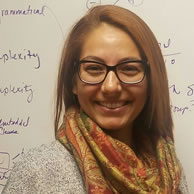
Background: Psychology
Reserarch Interest: Language in aging and neurodegeneration
What were your previous program(s) of study or experiences?
I was an undergraduate Psychology major at The University of Chicago, where I worked towards understanding the neurocognitive processes of memory. After graduation, I decided to leave the world of research for few years and work in in a state-funded community outreach program that assisted lower-income families in applying for and receiving medical coverage. Through this program, I met many speech-language pathologists who worked in various school districts, and I was immediately drawn towards the field and its pursuit of enabling individuals to communicate with the world around them.
What are your research interests?
My research interests are understanding the language profiles in acquired neurocognitive disorders in adults with neurodegenerative disorders. Specifically, I want to better understand how conflict monitoring mediates speech errors in Parkinson’s disease, and whether this cognitive process is associated with the high rates of verbal disfluencies in this population.
What is a project that are you working on now?
My current project tests whether adults with Parkinson’s disease are able to detect errors across different listening tasks at the same speed and accuracy as healthy unaffected adults. In this project, I am working closely with my advisor, Dr. Angela Roberts, in order to lay the foundation for future projects using EEG to investigate the neural responses of conflict monitoring.
What made you choose Northwestern’s CSD department?
I knew Northwestern CSD would be the best place for me, because this department allows me to work alongside leading researchers and focus on translational research. For me, it was very important to find a place that valued research geared towards impacting future therapy interventions. Additionally, this program encourages cross-disciplinary collaborations. For example, I am also working with Dr. Pam Souza to see how hearing loss in an older population may impede their ability to detect errors in a listening. This collaboration supports my work in understanding aspects of aging and a neurodegeneration population.
What resources or characteristics of Northwestern enable your research?
Northwestern’s close ties to various rehabilitation centers across the city allow me to work closely with Parkinson’s disease support groups in the Chicagoland area as well as movement disorder specialists. This support system allows to me continue my research with feedback from top professionals in the field.
What are your professional goals?
I hope to one day be tenure and innovate speech and language therapies for adults with neurodegenerative disorders.
